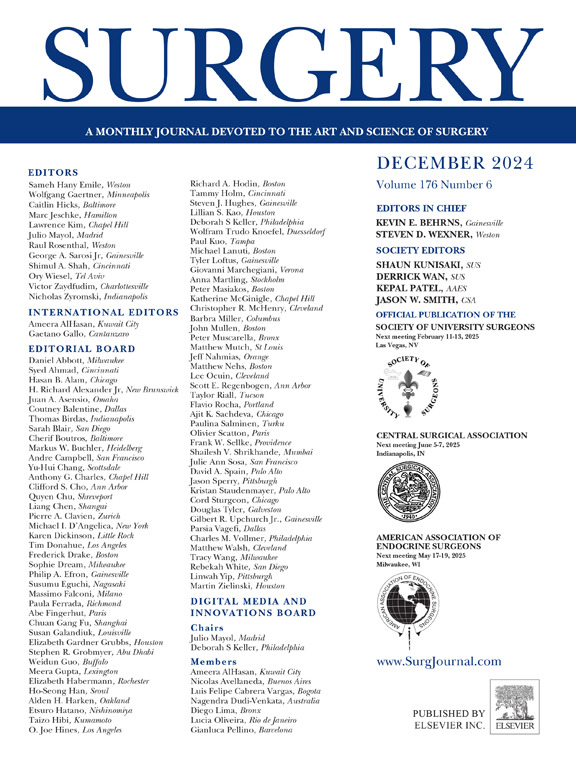Characteristics and role of surgery in nonagenarians with colorectal cancer: SEER database analysis
IF 3.2
2区 医学
Q1 SURGERY
引用次数: 0
Abstract
Background
As the population ages, nonagenarian patients with cancer are more frequently treated. This study aimed to assess the characteristics of colon and rectal cancer in patients aged ≥90 years and to evaluate the role of surgical intervention in this age group.
Methods
This retrospective cohort study included nonagenarian patients with colon and rectal cancer identified from the Surveillance, Epidemiology, and End Results (SEER) database from 2000 to 2020. We assessed the characteristics of nonagenarian patients with colon and rectal cancer and compared patients who underwent surgery with patients who did not undergo surgery. The main outcome measure was the effect of having surgery on overall survival and cancer-specific survival in nonagenarian patients.
Results
A total of 23,149 nonagenarian patients were included, 65.2% of whom were female. The most common sites of cancer were the right colon (47.9%), the left colon (21.1%), and the rectum (19.1%). Early-stage colon and rectal cancer (stage I or II) accounted for 48.2% of cases. Approximately 30% of patients did not undergo any surgical intervention. Of the 89.2% patients who died, the cause was colon and rectal cancer in 42.9%. An 18- and 11-month survival benefit from having surgery was found in overall and cancer-specific survival, respectively. When stratified by tumor-node-metastasis stage, this survival benefit was more prominent in early-stage disease.
Conclusion
Our study indicates that nonagenarian patients with colon and rectal cancer had increased survival if they underwent surgery when compared to patients who were not surgically treated. Physicians should consider treating nonagenarian patients according to their preferences and wishes, general condition, and disease stage.

求助全文
约1分钟内获得全文
求助全文
来源期刊

Surgery
医学-外科
CiteScore
5.40
自引率
5.30%
发文量
687
审稿时长
64 days
期刊介绍:
For 66 years, Surgery has published practical, authoritative information about procedures, clinical advances, and major trends shaping general surgery. Each issue features original scientific contributions and clinical reports. Peer-reviewed articles cover topics in oncology, trauma, gastrointestinal, vascular, and transplantation surgery. The journal also publishes papers from the meetings of its sponsoring societies, the Society of University Surgeons, the Central Surgical Association, and the American Association of Endocrine Surgeons.
 求助内容:
求助内容: 应助结果提醒方式:
应助结果提醒方式:


